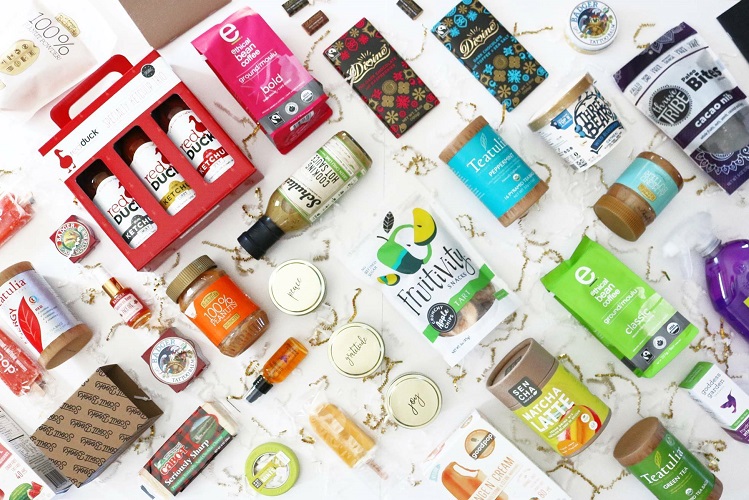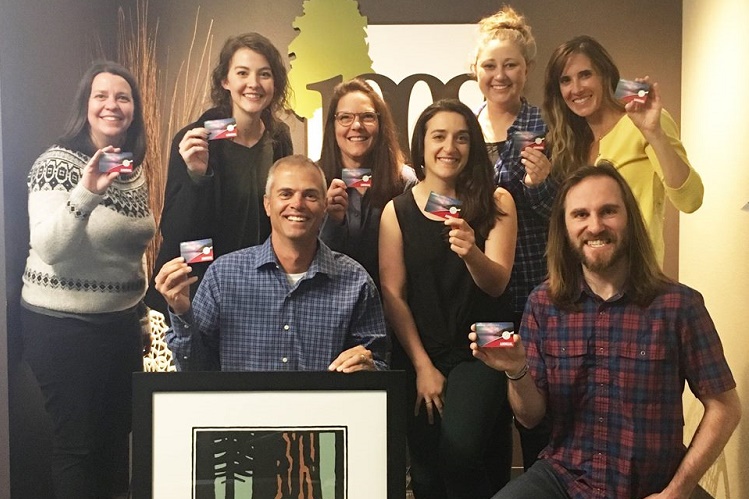Best for Colorado is a program of the Alliance Center. It allows Colorado companies to measure and improve their social and environmental impact, regardless of where they are on their corporate social responsibility journey. Best for Colorado offers programming and tools for all Colorado companies, including B Corps, to improve their practices and connect participating companies with local resources, education and support
How This Family Of Boulder Brands Is Making The World Better
Best for Colorado: 1908 Brands' mission is to make home better together
Lauren Farkas //October 24, 2019//


How This Family Of Boulder Brands Is Making The World Better
Best for Colorado: 1908 Brands' mission is to make home better together
Lauren Farkas //October 24, 2019//

Photo courtesy of 1908 Brands
1908 Brands' mission is to make home better together. The parent company consists of a family of brands, all based out of Boulder. It was initially founded with a manifesto to be conscientious of the people and planet by providing products with clean ingredients.
This family of brands includes Boulder Clean, Schultz’s, Bundle Organics, Thrive Tribe, Three Bears and Pasta Jay’s. With a strong commitment to create a better world through its many strategic partnerships, the company collaborates and leads working groups on sustainable packaging innovation, climate action leadership through business and impactful corporate giving strategies.
“Even if we are competitive on the shelves, we are collaborative for public benefit to help improve our impacts on the environment as businesses,” says Jessica Saba, director of corporate social responsibility for 1908 brands.
Lauren Farkas, programs assistant at The Alliance Center, sat down with Saba to learn more about the company and how it is executing its mission.
Lauren Farkas: Can you define the specific programs, practices and priorities that fall within your organization’s CSR? How has this evolved or improved over time?
Jessica Saba: I was brought on in 2016 to help build the B Corp programming and the 1% for the Planet giving fund. We paired those two efforts together so the money we donate to nonprofits helps us build partnerships, which then in turn supports our business operations and improves our business practices.
We set a goal of trying to improve our packaging because a lot of our products are single-use. We are part of the Sustainable Packaging Coalition, helped establish the Boulder Sustainable Packaging Working Group and we are also on the B Corp Sustainable Packaging Working Group.
Through these initiatives, we are working with other brands to try and figure out how to source innovations in the packaging industry. That collaborative work is really important and it comes from a goal that we set with the Climate Collaborative to improve our packaging over the next five years. We determined there was a problem, we set a goal and we joined the working groups and other trade industry groups that would help us improve our packaging. We now have two projects that are in the works with partners to develop a compostable film and to produce a bio-based container for Boulder Clean laundry detergent.
We hosted the essentials of sustainable packaging training for the Boulder and natural products community to try to improve the packaging literacy in the community. That is one of our main focuses right now. Working groups are a really powerful tool for sourcing new ideas, gaining new insights and developing new projects that are collaborative across brands.

LF: Can you expand on your integrated partnerships and creative corporate giving programs?
JS: We commit 1% of our revenue every year to environmentally focused nonprofits through a 1% for the Planet model. We can give 50% of our contribution in cash, 25% of our contribution in product donations and 25% of our contribution in advertising support.
Our giving program is focused around the year 1908, which is a really big year in land conservation. People started to donate acquired land back to the government. Our founder’s great, great uncle donated a chunk of land that became the Muir Woods National Monument in California, so our giving program centers on land conservation, outdoor recreation and encouraging people to develop a love for nature.
We partnered with Rocky Mountain Conservancy this year. In addition to giving them a cash donation to support their operating costs, we were able to purchase national park passes for all of our employees and encourage them to go and enjoy the parks.
LF: Where should other companies start if they want to create similar partnerships with nonprofits?
JS: I encourage all companies to look around and talk to nonprofits and ask, “What are you doing for our community and how can we help you?” Nonprofits are doing really important work. They need to be supported and the business community can make a huge impact on their wellbeing and livelihood just by giving small monetary or product donations.
LF: How do you screen and select the brands you choose to acquire?
JS: We acquire and build companies that have some sort of improved recipe or consideration for people. We want to replace products on the shelves with ones that have better ingredients.
LF: What are some of the challenges you face when connecting and communicating with suppliers about their social and environmental impacts?
JS: A challenge of our industry is to discover suppliers that meet our standards. Our brands are all different companies with different suppliers in different geographic areas. Every product requires a complicated supply chain and our supply chain manager is very conscientious that every ingredient we use is balanced between cost and quality. As a small company, research and relationship building takes time.
I would say the time and/or relationships are part of the challenges of communicating with suppliers. This is where collaboration comes in. It is really important to get referrals from other companies and ask them which companies are doing a good job and which ones they have had trouble with in the past, or don’t have the best practices.
LF: What is your proudest achievement or a specific challenge you faced? How did you overcome it?
JS: In 2016, I was given $130,000 to give away to environmental nonprofits and I didn’t know how to distinguish one nonprofit from the other. I wasn’t sure how to vet them, how to form a partnership or make a donation and I had a lot of questions. I started to reach out to other brands in the 1% for the Planet network. The nonprofit partnership manager director at Klean Kanteen and I started to talk and realized there were a lot of questions we both had about being an environmental grants manager. We decided to ask our CEOs for sponsorship money to produce a summit called the Give Back Gathering with managers from 120 1% for the Planet businesses.
We talked about how to build layered approaches to giving and partnerships, how to report on the impact of grant money and the work of the nonprofit, and how to talk about the work through your company and build activists through your consumers. It was such a robust and beautiful summit and it is now a bi-annual international summit that is owned by 1% for the Planet. 1908 was the lead sponsor on that, I got buy-in from the CEO and it was just remarkable and so fun to be part of that.
LF: What do you recommend for companies that want to begin to improve their company’s impact but don’t know where to start?
JS: It is important for the CEO to hire someone or direct someone to be in charge of developing the company’s impact strategy because the leader doesn’t necessarily have time. I think it needs to be a distinct role and responsibility that is given to one person who can really think deeply about it and bring recommendations to the CEO. Hiring someone is very important. So is giving them the freedom to attend B Corp or B Local events or go to The Alliance Center whenever they can to gain information and knowledge.
LF: Why did you join Best for Colorado? What are you hoping to gain from this partnership?
JS: 1908 is really proud to be a Colorado company. Boulder Clean has enjoyed the Boulder community for a long time and Colorado is an amazing place to exist among conscientious companies who hold themselves to really high standards. I think the Best for Colorado program gives companies access to resources that they can use to improve and reminds us all that we are part of a state wide community trying to show Colorado companies do things better. Being Best for Colorado really means something to us.

























